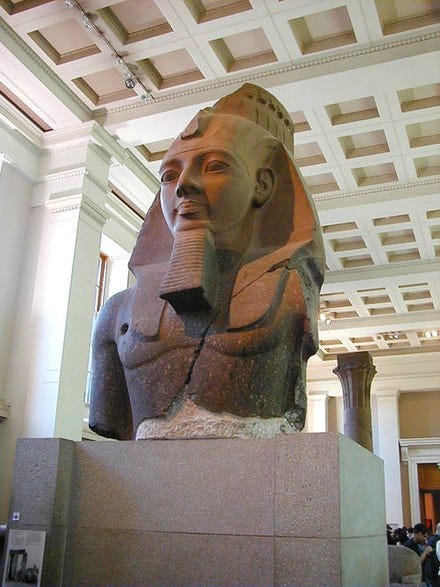The Greatest Poem I’ve Ever Read
In 1817, Victorian London was abuzz with excitement. Rumors had reached the city that an enormous statue of a long-forgotten pharaoh had been discovered in the sands of ancient Egypt by Italian explorer Giovanni Belzoni and was being transported to England to be gawked at by the public. “Egypt Fever” was at an all-time high.

In anticipation of the event, 2 young poets, Horace Smith and Percy Shelley (husband of “Frankenstein” author, Mary Shelley), decided to pass the time with a friendly competition to see who could write the best poem about the mysterious statue.
Shelley’s winning poem, Ozymandias, is perhaps one of the most haunting things I’ve ever read.
Here’s the poem (but I also highly recommend listening to the poem being read by Emmy Award winning actor, Bryan Cranston, of “Breaking Bad” fame)
OZYMANDIAS
I met a traveler from an antique land
Who said: Two vast and trunkless legs of stone
Stand in the desert. Near them, on the sand,
Half sunk, a shattered visage lies, whose frown,
And wrinkled lip, and sneer of cold command,
Tell that its sculptor well those passions read
Which yet survive, stamped on these lifeless things,
The hand that mocked them and the heart that fed:
And on the pedestal these words appear:
“My name is Ozymandias, king of kings:
Look on my works, ye Mighty, and despair!”
Nothing beside remains. Round the decay
Of that colossal wreck, boundless and bare
The lone and level sands stretch far away.
– Percy Shelley, 1817
There is something deeply personal about the image of a tourist coming across the ruined statue of a once-great king and realizing that no one really knows, remembers, or cares who “Ozymandias” was.
I’m certain that in his day, Ozymandias was supremely confident in the enduring power of his legacy. He may have graced the covers of ancient Egypt’s magazines and been constantly talked about in Egyptian coffee shops, university classrooms, and political news. He may have been renowned throughout the known world.
But the great lesson of the poem is this: the ravages of time will erase all things. Even the greatest men and women are fated to decay into oblivion. No one, no matter how talented or famous, can build anything that will be remembered for long.
Ozymandias’s message to all us = you will be forgotten. It’s only a matter of time.
If you like what you’re reading (so far), share it with someone who’d also find it interesting
The foolishness of trying to build a “legacy”
What’s frightening is how quickly we can be forgotten.
A few weeks ago I was speaking with a mentor who had been a partner at a world famous consulting firm for over 20 years. He had been an integral part of building the practice and determining what the company’s strategy would be for the next several years. He had retired just 2 years ago and I asked him how it felt to be on the outside after 2+ decades of service. His answer caught me off guard:
“I’ve been amazed, and somewhat saddened to realize how quickly the company moved on from me. I found out that most of the things I built at the firm have been mothballed and very few people remember who I am. It’s only been 24 months. It’s been a reminder to me that you’re never as important as you think you are, so you shouldn’t put your self-worth or stock in things like your career.”
We’d probably like to think “that will never happen to me!”, but the more folks I talk to I find that to be the rule, rather than the exception. Most people are forgotten within a matter of a few years after they leave what they were part of building. Some people (e.g: Steve Jobs, Jane Goodall, Mother Teresa, Elon Musk) may be remembered for a few decades. Others (e.g: Cleopatra, George Washington, Julius Caesar) may survive human memory for hundreds or even thousands of years, but they’ll get forgotten too, eventually.
After all, how many of us talk in our MBA programs about the names/accomplishments of the merchants of Carthage or even know the names of the best businessmen in early America?
People like to trumpet their success at having made it to the big leagues.They know that their Stanford diploma will forever sit on their wall and grace their social status.Their acceptance into McKinsey’s close-knit brotherhood will preface their resume and professional introductions at every event they attend.
The problem with all of this is the harsh reality that all of these “accomplishments” will be utterly and completely forgotten in an incredibly short amount of time as far as history is concerned. We tie ourselves up in riches and institutions that are as lasting as a snowflake on a hot summer’s day.
Who was Ozymandias? No one knows, and no one cares. We think of our world as permanent, but the reality is that it is anything but. Why pin our hopes and value on a specific institution or company that is likely to be forgotten to the sands of time far faster than we would hope or expect? Harvard or Google may seem really important right now, but no one will care or remember it later, especially after you’re gone. Don’t build your happiness on something so fleeting.

Build What Matters
I feel like this has been a depressing article so far, and that has not been my intention. The concept of our relative insignificance in the march of time is a hard thing to grapple with. And I certainly don’t claim to have the right answer to this.
But it’s not all bad news. There is something very liberating about realizing that your “legacy” (as we usually think of it) doesn’t matter in the end. It allows you to focus on what does matter.
The title of a recent Sahil Bloom article hit me hard – “PSA: 20 years from now the only people who will remember you worked late are your kids”.
What I appreciated most about Sahil’s post is that it was actually more nuanced than it first appeared. His article makes 2 critical points:
1. Being present and spending time with your children is the most important thing.
2. Having your children see you work hard on things you care about is a principle they’ll remember for the rest of their lives.
I think that point #2 often gets lost when we swing the pendulum too far the other way. Watching my dad (a doctor and church leader) spend many many hours working hard to heal others and serve in our church was instrumental in teaching me the value of working hard on a cause you believed in.
Just because we’ll be forgotten eventually doesn’t make our lives insignificant now. People exist to find happiness and peace. But it doesn’t come from recognition or fame. It comes from doing work that matters to you, from spending time with loved ones, from building memories that bring happiness.
It’s for that reason that I’ve started showing up to dinner at 6pm (even though I’m certain my current company would love me to work 24/7). It’s why I’m determined to work on things that genuinely excite me and add value to the world (as opposed to chasing prestigious titles and companies that offer “fame” but soul-sucking work).
In Conclusion
The poet Mary Oliver once asked “what will you do with your one wild & precious life?”
Realizing you’ll be forgotten in the end frees you up to spend your “wild and precious life” on the things that matter most to you. Or as Tim McGraw would put it, “live like you were dying”
Find what excites and inspires you. Spend your time on that rather than trying to build a “legacy”. My belief is that if you do so, you’ll end up living a life you & your family would be proud of. That’s important because if we can’t be remembered, we should at least be loved.


